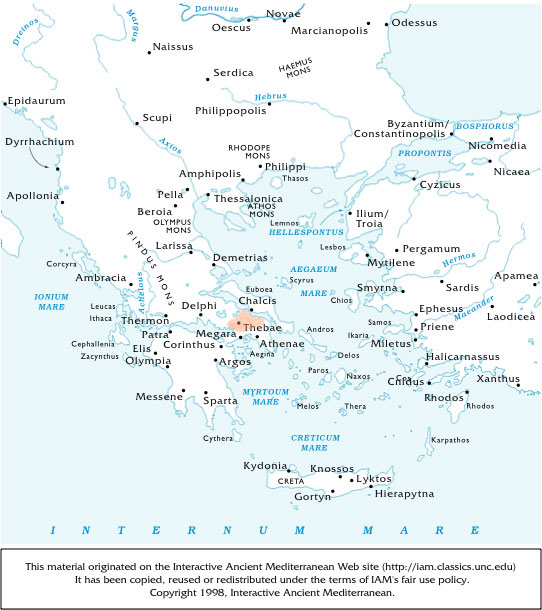A country of Greece proper, lying to the northwest of Attica, and shut in by the chains of Helicon, Cithaeron, Parnassus, and, towards the sea, Ptoüs; which mountains enclosed a large plain, constituting the chief part of the country. Numerous rivers, of which the Cephissus was the most important, descending from the heights, had probably stagnated for a long time, and formed lakes, of which the Copa ïs was the largest. These same rivers appear to have formed [p. 213] the soil of Boeotia, which is among the most fruitful in Greece. Boeotia was also perhaps the most thickly settled part of Greece, for no other could show an equal number of important cities.This country, as we learn from the concurrent testimony of Strabo, Pausanias, and other ancient writers, was first occupied by several barbarous claus, under the various names of Aeones, Ectenes, Temmices, and Hyantes. To these succeeded, according to the common account, Cadmus and his followers, who, after expelling some of the indigenous tribes above mentioned, and conciliating others, founded a city, which became afterwards so celebrated under the name of Thebes, and to which he gave the name of Cadmea. The descendants of Cadmus were compelled, subsequently, to evacuate Boeotia, after the capture of Thebes by the Epigoni, and to seek refuge in the country of the Illyrian Encheleës ( Herod.v. 61). They regained possession, however, of their former territory, but were once more expelled, as we learn from Strabo, by a numerous horde of Thracians and others. On this occasion, having withdrawn into Thessaly, they united themselves with the people of Arné, a district of that province, and for the first time assumed the name of Boeotians. After a lapse of some years, they were compelled to abandon Thessaly, when they once more succeeded in re-establishing themselves in their original abode, to which they now communicated the name of Boeotia. This event, according to Thucydides, occurred about sixty years after the capture of Troy; but, in order to reconcile this account with the statement of Homer, who distinctly names the Boeotians among the Grecian forces assembled at that memorable siege, the historian admits that a Boeotian division (apodasmos) had already settled in this province prior to the migration of the great body of the nation (i. 12).
The government of Boeotia remained under the monarchical form till the death of Xanthus, who fell in single combat with Melanthus the Messenian, when it was determined to adopt a republican constitution. This, though imperfectly known to us, appears to have been a compound of aristocratic and democratic principles, the former being apparent in the appointment of thirteen annual magistrates named Boeotarchs (see Boeotarches), who presided over the military as well as civil departments; the latter in the establishment of four councils, which were possessed, in fact, of the sovereign authority, since all measures of importance were to be submitted to their deliberation. The general assembly of the Boeotian Republic was held in the temple of the Itonian Athené. From the extent and population of their territory the Boeotians might have played the first part in Greece, if they had not been prevented by the bad government of the cities, by the jealousy of Thebes, and the consequent want of union. And yet the example of Epaminondas (q.v.) and Pelopidas (q.v.) afterwards showed that the genius of two men could outweigh all these defects. The Boeotians were regarded by their neighbours, the Athenians, as naturally a stupid race. Much of this, however, was wilful exaggeration, and must be ascribed to the national enmity which seems to have existed from the earliest times between these two nations. Moreover, this country produced, in fact, many illustrious men, such as Hesiod, Pindar, Plutarch, Epaminondas, and Pelopidas. In Boeotia, too, Mount Helicon was sacred to the Muses, to whom also many of the fountains and rivers of the country were consecrated.
In Boeotia are several celebrated ancient battle-fields, the former glory of which has been increased by later events; namely, Plataeae (now the village Kokla), where Pausanias and Aristides established the liberty of Greece by their victory over Mardonius; Leuctra, where Epaminondas triumphed over the Spartans; Coronea, where the Spartan Agesilaüs defeated the Thebans; and Chaeronea, where Philip founded Macedonian supremacy on the ruins of Grecian freedom. Near Tanagra, the birthplace of Corinna, the best wine was produced; here also cocks were bred, of remarkable size, beauty, and courage, with which the Grecian cities, passionately fond of cock-fighting, were supplied.
The best-known towns of Boeotia were Orchomenus, Tegyra, Haliartus, Coronea, and Chaeronea, near Lake Copais; Larymna, Phocae, Aulis, Delium, and Oropus, near the Euripus; Thisbé, Ascra, Thespiae, and Leuctra, near the Gulf of Corinth; Thebae, in the plain between Lake Hylica and Mount Teumessus; Potniae and Therapnae, south of Thebes; and Plataeae, Erethrae, Eleum, Tanagra, and Pherae, in the valley of the Asopus. (Harpers Dictionary of Classical Antiquities, 1898)
